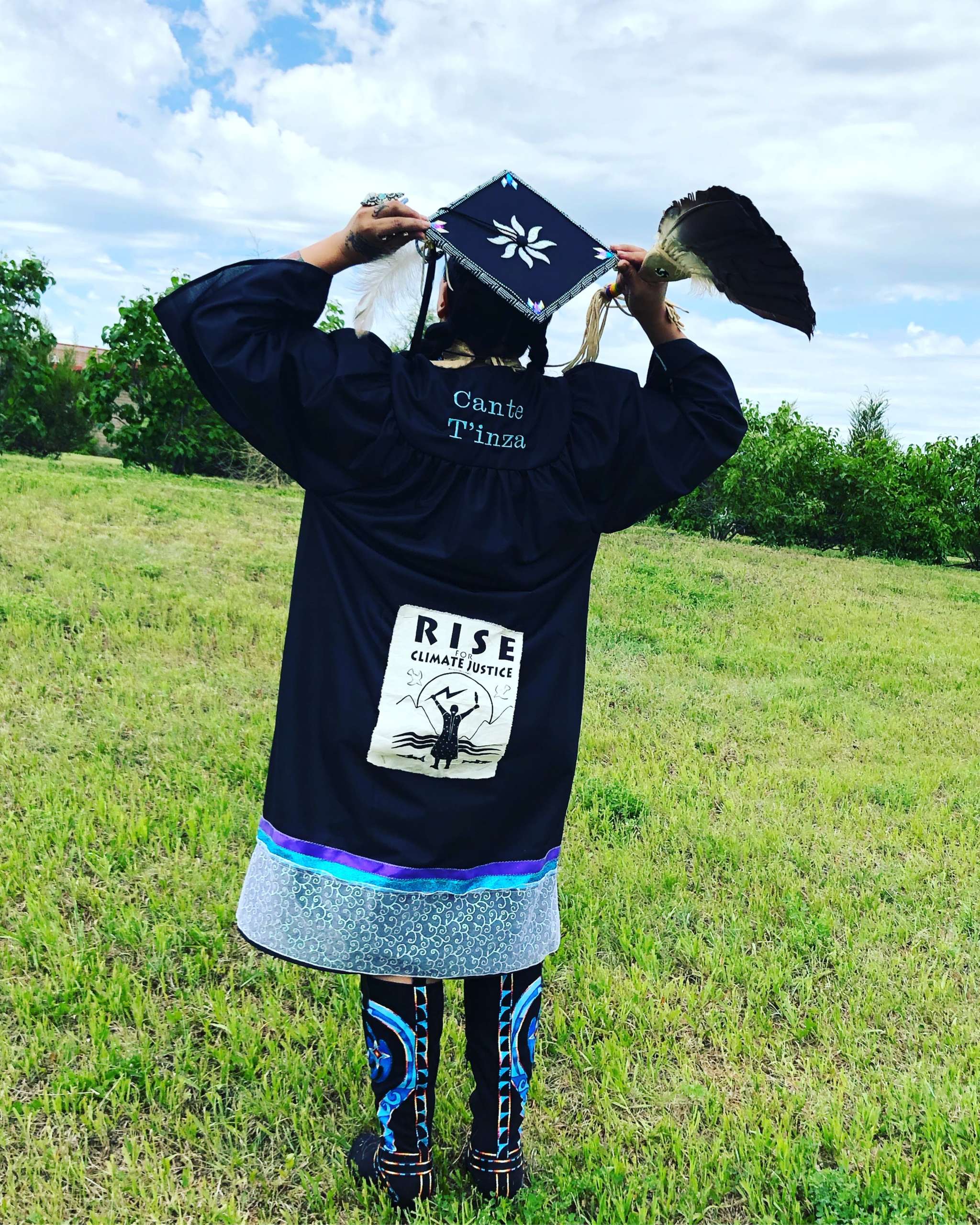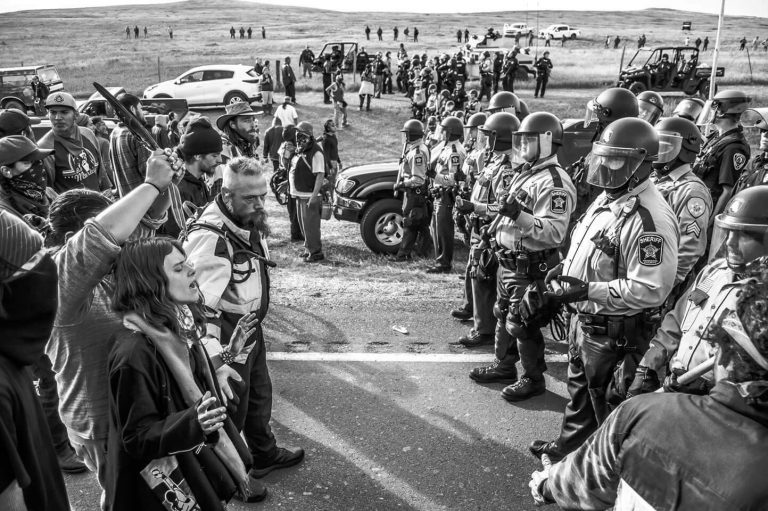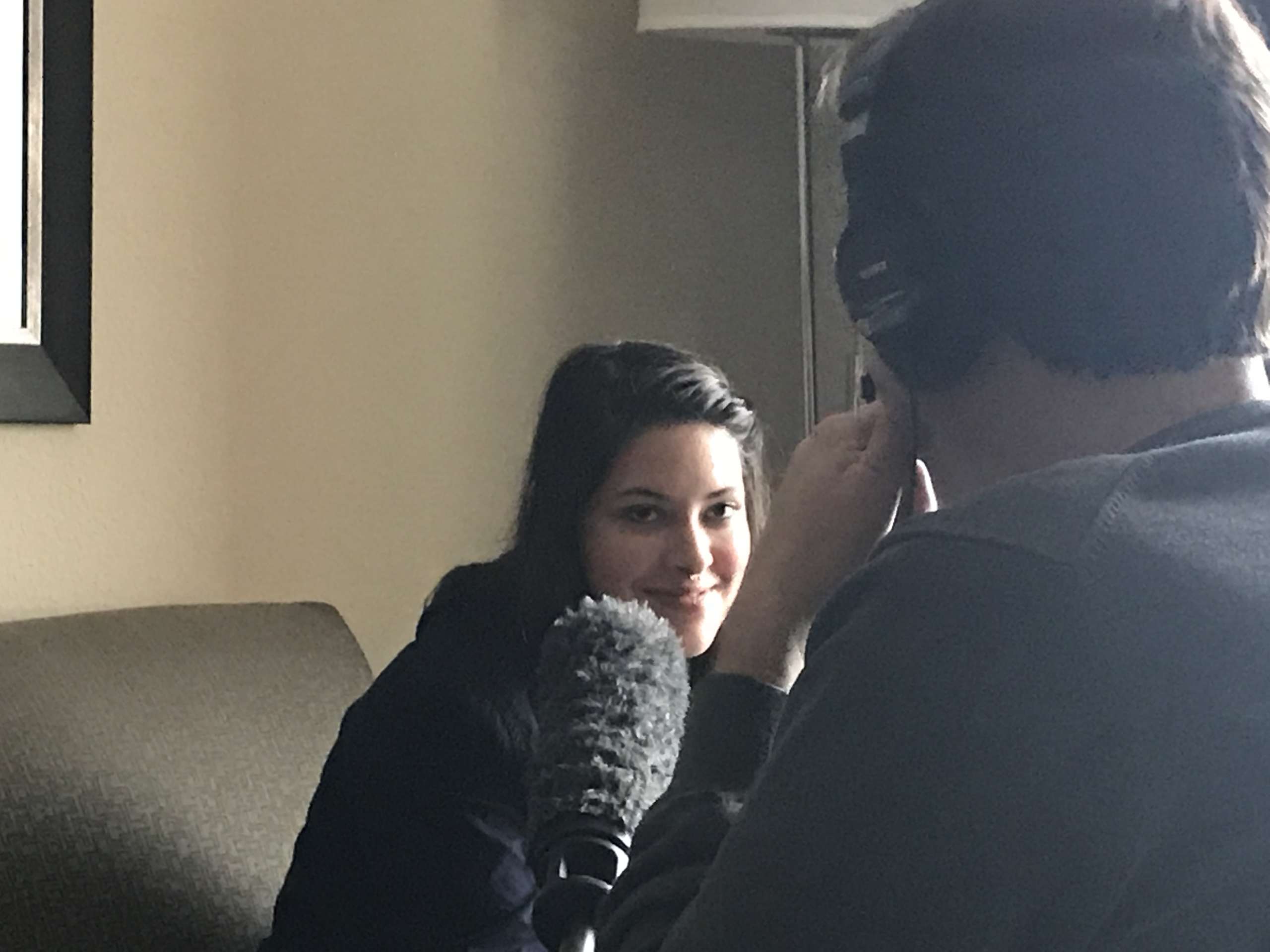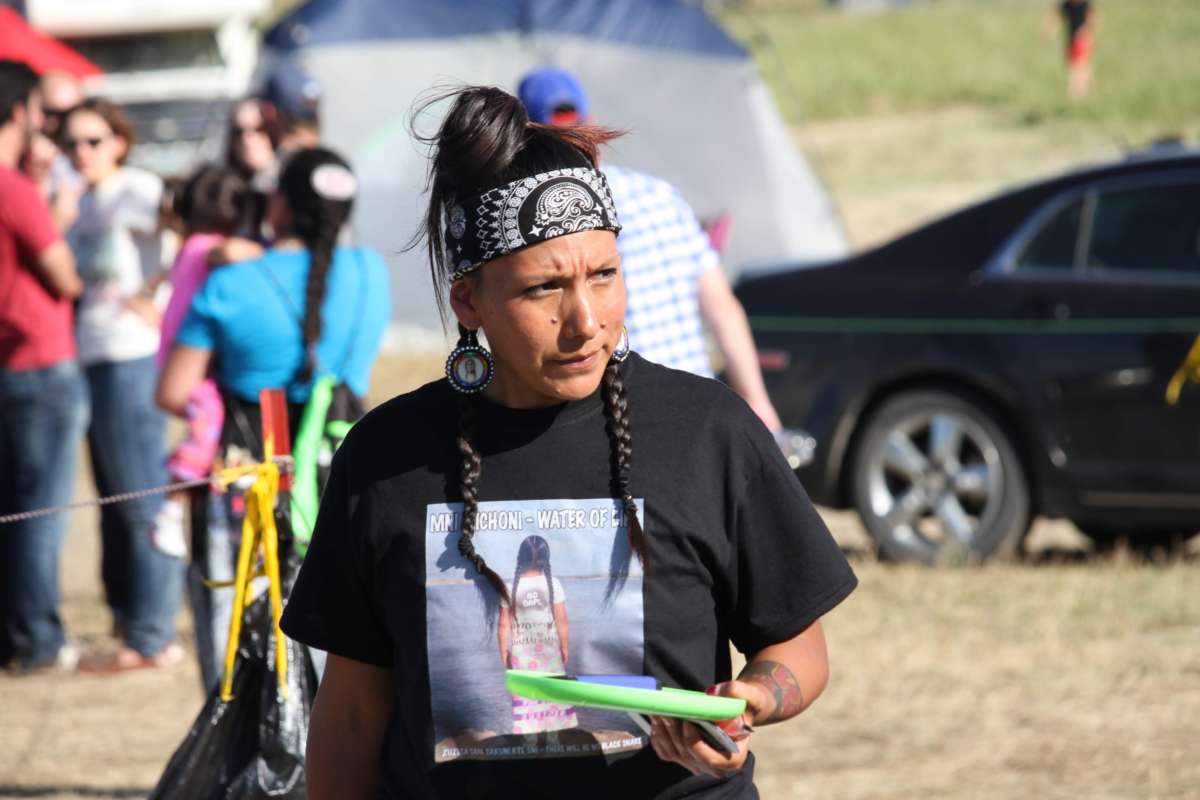“The hardest part about locking down, is deciding to do it,” Mark K. Tilsen told Truthout.
It’s been almost four years since Mark’s brother Nick Tilsen (Oglala Lakota) and Daniel T’seleie (K’asho Got’ine Dene) attached themselves to excavators with handcuffs inside PVC piping in a device called a “Sleeping Dragon” to stop construction of the Dakota Access Pipeline (DAPL) at Standing Rock. Mark emulated them on his 35th birthday, July 6, 2018, at the Bayou Bridge struggle in the swamps of southern Louisiana. Bayou Bridge is the end of the DAPL pipeline. When cut loose and arrested, Tilsen was cuffed behind his back with zip ties and then lifted up by the cuffs by five cops who wrenched his shoulder so severely out of its socket, he still feels the injury on cold days. A “fair trade” he calls it. He had seen a lot worse at Standing Rock.
Tilsen has published a poetry collection, now in its third printing, It Ain’t Over Until We’re Smoking Cigars on the Drill Pad. Its title pithily sums up his response to a recent spate of favorable rulings awarded by courts on the Keystone XL Pipeline, DAPL, Atlantic Coast and Bayou Bridge pipelines. “I’m somewhat cynical,” he admitted with a laugh. T’seleie, too, is circumspect about attributing too much energy to the seeming wins, knowing how they often turn out to be partial, tentative or fragile, or are meant to diffuse resistance just when it’s crucial to ramp it up.
Truthout reached out to Mark Tilsen, T’seleie and three other Standing Rock front-liners — Karla Colon (Taíno), Olive Bias (Appalachian Water Protector) and Floris White Bull (HunkPapa Lakota and Cochití Pueblo) — for their thoughts and reflections on how effective organizing done well then contributed to a strengthened movement now.

The Struggle Built a Foundation for Common Leadership
Tilsen counts the establishment of the encampment itself as a foundational success. “It’s definitely not a coincidence that it happened at Standing Rock,” he said. “The Lakota people are like every tribe in [the U.S.], but more so — an intense people living in extreme conditions.”

Living at camp and being rooted in Lakota ceremony were key to the transformation at the core of the Water Protector movement, from individual self-interest to community survival. Where the courts are the arena in which movement lawyers operate, the prayer camp was the site from which those willing to risk themselves in direct action were propelled.
Standing Rock was like “a university of what leadership is and isn’t.” Having grown up on the tail end of the Red Power movement, he’d thought that a leader is “usually the loudest Native man on a bullhorn.” But at camp, their goal was “to empower all people to do what was in their hearts to protect the water.”
In his poem “Camp Life,” Tilsen writes:
It’s not that we were free
not really
But on a clear day
we could see what
freedom looked like
This glimpse was motivating “to throw down powerfully,” and not just for young people.
“Elders were on the front line, some with severe mobility issues, with walkers, going toward the cops, living on oxygen in camp, fighting terminal illnesses; one who spent some of his last time before going into hospice care told us not to worry about him, but to stay focused on fighting the pipeline,” Tilsen recalled. “People whose names you’ll never know, who weren’t in the limelight.”
The work stoppages they inflicted on Energy Transfer Partners, whether for 15 minutes or a whole day, cumulatively cost the pipeline operator a world of pain.
“At the time of the sabotage against DAPL, Energy Transfer Partners didn’t want to make an issue publicly of how much it hurt, damaged and befuddled them,” he says. But the repression that ensued “woke up the whole world to the Indigenous activism against the fossil fuel industry on six continents.”
Indigenous Sovereignty Is Essential to Combat Climate Change
Climate justice organizer Daniel T’seleie told Truthout that the effects of global warming on his Dene homelands in the Arctic have been profound and are an existential threat to the caribou, a mainstay of his people’s food security and the spiritual heart of Dene culture.
“We’re looking at a future where the land may be fundamentally different, where there’s a potential for not being able to hunt caribou. The more we go down that road, the more it will impact who we are as Dene people,” he cautioned.
In the “adaptation or mitigation” conversation, there’s really no choice.
“There’s no possibility for us to adapt to the loss of the caribou,” he said from the depths of his decades of experience, starting as a youth climate organizer, working within a UN frame on several continents. “The only viable option for responding to climate change, if we’re serious, is mitigation. We have to transition.”
In his view, Standing Rock was a dramatic and urgent object lesson in many usually abstract political concepts — Indigenous sovereignty and climate and environmental justice among them. It catalyzed the contemporary Indigenous sovereignty movement on this continent and generated pushback against colonialism, imperialism and capitalism worldwide.
“Sovereignty is important for all Indigenous nations,” T’seleie counseled, “because we have our own governance structures, laws, legal orders, or in some cases legal systems, and we were here before Canada, the United States or Mexico — before any of these settler states even existed. It’s a matter of justice for us to have the right to continue to make decisions for ourselves.”
From a climate justice analysis, climate change will not be sufficiently mitigated unless the underlying structures are changed, especially structures like colonialism. He advises that the single most important thing people can do is to find struggles doing Indigenous sovereignty work, like the Wet’suwet’en people in their fight against the Coastal GasLink pipeline in Canada, and meaningfully support them.
The present moment offers two other crucial opportunities, according to T’seleie: Joining with the movement for Black lives as it rises up against police terror because “liberation is not a zero-sum game;” and COVID-19 because “now is the time to push for the fundamental change that we need.”
“The pandemic provides a completely different social reality in which myths often told about fossil fuel and the economy are being debunked,” he said. “It’s undercutting some of the control narratives that shut down our movements. People are seeing that it is possible to drastically reduce extraction and rapidly transition off fossil fuels.”
Preserving the Health of the Earth
“With this virus, nature gets a break,” Floris White Bull told Truthout. “The beaches are empty so the sea turtles have a chance at undisturbed birthing in their birth cycles. All these different instances of healing. This is all connected in a way to what we were doing. That it wasn’t just about a pipeline, but it was for the Earth, for life and the future.”
White Bull’s home is on the Standing Rock reservation and she remains as committed to resisting the pipeline now as she was when she was on the front lines getting arrested for criminal trespass on her own lands.
“As Indigenous people, we stand by those actions. We want to be able to hold our head up in the future,” she said, “and we hold ourselves accountable to our ancestors.”
While at camp she was in college, submitting her assignments to her professors via her laptop in a yurt. She has since gained several more degrees in environmental science so she can fulfill her personal mission: to create a body of work that can directly inform the Environmental Impact Statement under contention in her tribe’s lawsuit. Its suit, brought by Earthjustice, seeks to compel a full environmental review of the impact of the pipeline on the Standing Rock Sioux Tribe, something the operator skipped over, and a re-do on the bogus approvals of the permits. The oil is set to stop flowing by court order, and the pipeline must be emptied by August 5, until the Environmental Impact Statement is completed, which will take years. The operator has asked for a stay of the order while the case is under appeal and the tribe has answered them. No hearing is yet scheduled.

“I’m looking at plants, medicines and traditional foods along the Missouri River, so I never really stopped fighting in that sense,” White Bull said. “So much of our health and the medicines and plants we harvest and eat are impacted by pipelines.”
She says the rulings, which may slow the pipelines’ advance or stop them altogether, feel like something the Earth needs.
“In our pursuit of comforts, we’re taking too much away from the future; we need everybody to understand the impact of their decisions, the weight of their privilege, and how much we’re wanting to change.”
Resisting Police at #NoDAPL
For Karla Colon, the decision to join the prayer camps at Standing Rock was a leap of faith, a turning point and a defining moment all rolled into one.
“I was done talking about it, about things that I found unjust,” Colon told Truthout. “I wanted to physically do something.”
So she traveled to North Dakota. The #NoDAPL uprising at Standing Rock was her first protest ever.
“The first time I walked toward a police line it was National Guard; they all had huge shields and guns, and we were walking straight toward them because it was at the bridge,” she recalled. “We were going to ceremony, and I remember feeling not scared — like we could do anything, we could literally achieve anything. That’s something that came out of camp — this complete sense of purpose together, that we could have anything together with the community we built, it was going to be okay and we were going to take care of each other.”
This alternative vision activates her in rural Massachusetts as her community in the Western part of the state moves to defund the police and build a sustainable future, one that is intersectional. She’s reluctant to name her specific town because as part of her personal process of decolonizing she gives less and less credence to the ideas of contrived borders, boundaries and real estate. In addition to Black abolition and liberation struggles, with an emphasis on mutual aid, her heart is also in organizing to abolish ICE immigrant detention. She knows communities can exist without police because she’s lived it at camp; police were not allowed into her camp.
“I have this understanding that it is possible, we can build that community, without police. People do care about each other and they can come together and make a change. When we’re supporting each other, it allows for other really beautiful things to grow in community, when we all make sure that we’re all okay.”

The Fight Will Continue Past the Pipelines
“We’re still tangibly struggling, even if the oil stops, we’re still fighting the pipeline,” Bias, who uses they/them pronouns, told Truthout.
They’re referring to the ongoing sentences of two Standing Rock Water Protectors still in federal prison who are doing what they can to stay out of COVID-19’s way. The virus has reached both of their institutions, Sandstone in Minnesota and Dublin in California, and the support committee, on which both they and Karla Colon serve, is ever diligent in its pursuit of liberty for them. Bias had spoken to an NPR reporter earlier in the day, trying to draw attention to the injustice of their being imprisoned during a pandemic.


For Bias, Standing Rock was a proving ground for the idea that another more just world is possible.
“Looking at the magnitude of camp, we literally made history in so many ways,” they said. Dakota-, Nakota- and Lakota-speaking peoples came together for the first time in over a hundred years. “The Oceti Sakowin, the Seven Council Fires; we were occupying treaty lands; that was a big deal that we stayed out there,” Bias said.
The absence of police in the camp did not mean there were no accountability processes, but they were aligned with traditional societal structuring and values derived from water ceremonies, inipi (sweats), songs and offerings. Out of that positivity, the idea emerged to use ceremony as a way to stop construction — more than a tactic, a holy embodied experience — that they got to live.
“When I got arrested … we sat with an elder with prayer ties — that’s how we were holding space,” Bias said.
The state had it all wrong calling the people they targeted for charges “ringleaders.”
“Everyone had designated roles,” they said. “I’m going to be an arrestable, or a police liaison, I’m the one who’s going to lock down [the] equipment. We had to go through that collectively, people were not rogue, and no one was a leader.”
They say they were unarmed people going out of their way, they knew the risks, they were making sacrifices, so that we could live differently.
“We all took those risks, the brutalizations, you lose count. How many times did I have my chest thumped or they’d push you? How many times was I pepper sprayed, tear gassed? I was sprayed with nerve agents on November 20, 2016. We stood in the river, we all risked hypothermia, to let them know we’re here for the water. We didn’t get hypothermia. We felt that the water we’re trying to protect is literally protecting us.”
They say they met a lot of their objectives. They wanted to stop construction, and they did; they wanted to stop the police, and they did. Not every time, but many times.
“People are so much more capable than we can ever possibly realize,” Bias declared. “It’s going to take a lot of acts of willingness to pull this off as a species. Either human beings are going to decide, or the Earth is going to decide for us.”
Our most important fundraising appeal of the year
December is the most critical time of year for Truthout, because our nonprofit news is funded almost entirely by individual donations from readers like you. So before you navigate away, we ask that you take just a second to support Truthout with a tax-deductible donation.
This year is a little different. We are up against a far-reaching, wide-scale attack on press freedom coming from the Trump administration. 2025 was a year of frightening censorship, news industry corporate consolidation, and worsening financial conditions for progressive nonprofits across the board.
We can only resist Trump’s agenda by cultivating a strong base of support. The right-wing mediasphere is funded comfortably by billionaire owners and venture capitalist philanthropists. At Truthout, we have you.
We’ve set an ambitious target for our year-end campaign — a goal of $250,000 to keep up our fight against authoritarianism in 2026. Please take a meaningful action in this fight: make a one-time or monthly donation to Truthout before December 31. If you have the means, please dig deep.
